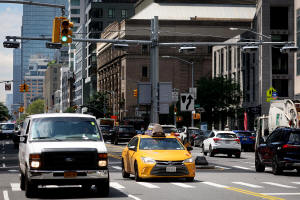|
Among the defendants in the lawsuit are the Metropolitan
Transportation Authority (MTA) and U.S. Federal Highway
Administration (FHWA).
New York's plan to impose tolls on vehicles entering certain
parts of Manhattan to fight congestion and pay for mass transit
already faces a lawsuit from the state of New Jersey. Under the
plan, New York City will charge a daily toll of $15 for
passenger vehicles driving in Manhattan south of 60th Street. It
will charge up to $36 for larger trucks.
New York says more than 900,000 vehicles enter the Manhattan
Central Business District daily, reducing travel speeds to
around 7 miles an hour (11 kph) on average.
Joining the teachers union lawsuit in challenging the congestion
pricing plan is Staten Island Borough President Vito Fossella.
According to the lawsuit, the pricing plan "would inflict
environmental and economic damage on already challenged
neighborhoods" by diverting traffic and increasing pollution to
areas like the South Bronx. It said the city's decision to adopt
the plan came after "a rushed and hurried process that violated
the comprehensive review requirements."
FHWA declined to comment.
The MTA said the environmental review process "involved four
years of consultation with government agencies, public outreach
meetings, and engagement with tens of thousands of public
comments ... If we really want to combat ever-worsening clogged
streets we must adequately fund a public transit system that
will bring safer and less congested streets, cleaner air, and
better transit."
The MTA voted last month to give the plan preliminary approval
and will accept public comments through March 11.
New Jersey's lawsuit also argued the FHWA environmental review
of the plan was inadequate and said it ignored the financial and
environmental burdens on New Jersey residents.
New York City, which has the most congested traffic of any U.S.
city, would become the first major city in the U.S. to follow
London, which implemented a similar charge in 2003.
New York said the charge would cut traffic by 17%, improve air
quality and increase transit use by 1% to 2%. The toll would
generate $1 billion to $1.5 billion a year and support $15
billion in debt financing for mass transit improvement.
(Reporting by David Shepardson in WashingtonEditing by Leslie
Adler and Matthew Lewis)
[© 2023 Thomson Reuters. All rights
reserved.]
Copyright 2022 Reuters. All rights reserved. This material may
not be published, broadcast, rewritten or redistributed.
Thompson Reuters is solely responsible for this content.

|
|




